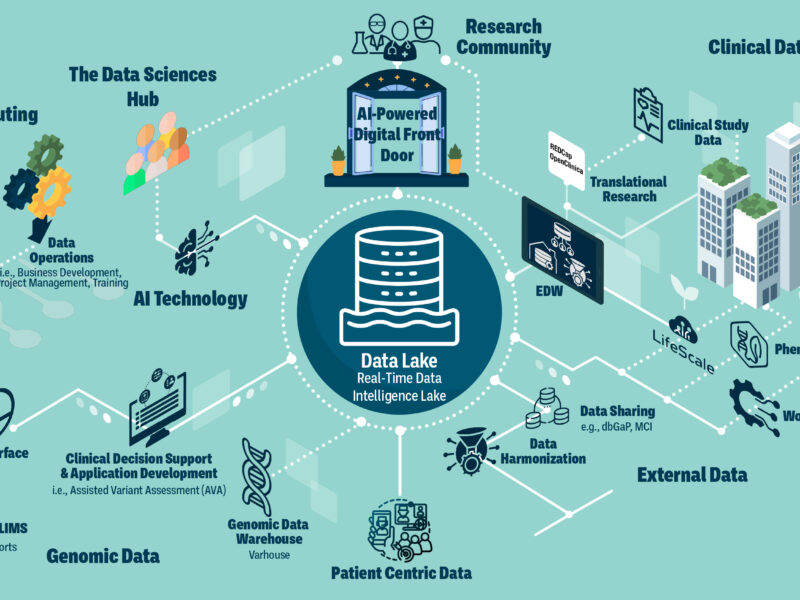Enhancing Intestinal Rehabilitation Workflow with Disease-Specific Documentation Tools
Enhancing Intestinal Rehabilitation Workflow with Disease-Specific Documentation Tools https://pediatricsnationwide.org/wp-content/themes/corpus/images/empty/thumbnail.jpg 150 150 Erin Gregory Erin Gregory https://secure.gravatar.com/avatar/?s=96&d=mm&r=g- October 30, 2023
- Erin Gregory
Structured data entry not only reduces the amount of time physicians are spending in the electronic health record but also opens the door for new research.
A recent study published in JAMA Pediatrics by Nationwide Children’s Hospital’s Ethan Mezoff, MD, Jennifer Lee, MD, and team has shed light on a promising solution to improve the quality of care for intestinal failure patients: the implementation of disease-specific documentation tools. The research project, conducted over a span of six years from January 1, 2017, to March 28, 2023, investigated the impact of using a content expert-developed clinical documentation tool on the workflow in intestinal rehabilitation.
Advancing Technology to Improve Outcomes
“Dr. Mezoff and the team at Nationwide Children’s Hospital built a tool that was very complex and designed in such a way that not only saved time, but people wanted to use it,” says Dr. Lee, a gastroenterologist and clinical informatician at Nationwide Children’s and assistant professor of pediatrics at Ohio State University. “In an era where increased administrative work within the electronic health record is a contributor to burnout, this is an example of a tool that can not only decrease the overall administrative burden on clinicians but also have potential to progress the science and improve outcomes for these vulnerable patients.”
The project involved a series of interventions designed to streamline the information documentation process and gather valuable disease-specific data. The first intervention, which went live on May 13, 2019, involved modifications to the clinic note template. This was followed by the development and testing of a custom-built documentation toolset, which was made available in the local electronic health record system on May 11, 2021. The tools transitioned patient notes from free text to structured data over several months.
“I worked with Ali Garmin, a Nationwide Children’s Hospital analyst, to pull data on years of notes. I crunched the numbers and found what we showed in the study – a substantial improvement in time to chart closure after the tools were in use. I realized I needed to publish this finding to entice other centers to join us in structured data acquisition, which is the first step to a learning health system in which patient care continually improves, in part by virtue of seeing the patient,” says Dr. Mezoff, a gastroenterologist at Nationwide Children’s and an associate professor of Clinical Pediatrics at The Ohio State University College of Medicine.
A More Efficient Approach to Patient Care
Over the course of the project, 272 patients were seen by nine providers in 4,809 ambulatory encounters, 91.5% were diagnosed with short bowel syndrome. The median number of visits per patient was 11, highlighting the chronic nature of the condition.
Key accomplishments from the project include:
- Decreased time from patient arrival to encounter closure.
- More concise and focused documentation.
- Increased average of disease-specific data elements captured per visit.
“The ultimate goal is to share this tool far and wide,” says Dr. Mezoff. “If 50 centers use this tool to see their patients, there are 50 centers of patients with structured, disease-specific data on each of their visits. With that, we can learn about the natural history of the disease, perform comparative effectiveness research, engage in multisite quality work…the sky is the limit.”
The next step for Dr. Mezoff and the Nationwide Children’s Hospital team is to connect the sites digitally so they can start learning from the aggregate of their work. The documentation toolset’s portability and interoperability across multiple centers open up exciting possibilities for creating a multisite digital platform. For patients with intestinal failure, these tools represent a significant step towards more efficient and effective healthcare delivery. While this tool is developed specifically for intestinal failure it is also a model for other complex and rare disease processes with the potential to be replicated.
Reference:
Mezoff EA, Gil LA, Lee JA, Gumer, L, Namjoshi SS, Hoffman JM, Wendell D. Digital phenotype generation and time to encounter closure. JAMA Pediatrics. 25 Sept 2023. [Epub ahead of print]
About the author
-
Erin Gregoryhttps://pediatricsnationwide.org/author/erin-gregory/September 27, 2023
-
Erin Gregoryhttps://pediatricsnationwide.org/author/erin-gregory/
-
Erin Gregoryhttps://pediatricsnationwide.org/author/erin-gregory/January 4, 2024
-
Erin Gregoryhttps://pediatricsnationwide.org/author/erin-gregory/
- Posted In:
- Clinical Updates
- In Brief
- Research








